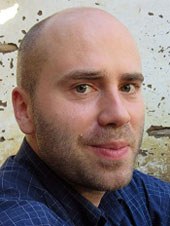Dr. Leonard Böhm
Dr. Leonard Böhm
Wissenschaftlicher Mitarbeiter
Institut für Bodenkunde und Bodenerhaltung, iFZ
Heinrich-Buff-Ring 26-32
35392 Gießen
Raum: B229
Tel.: +49(0)641 99 37116
Fax: +49(0)641 99 37109
E-Mail: leonard.boehm
Arbeitsschwerpunkte
- Transferverhalten von organischen Schadstoffen in Umweltmedien: Sorption und Bioverfügbarkeit in Böden, Sedimenten und Gewässern; Nanopartikel-katalysierte Dehalogenierung von Organohalogenverbindungen
- Festphasenmikroextraktion (SPME), Gaschromatographie-Massenspektrometrie (GC-MS)
Projekte
- Tonminerale als Sorbenten für hydrophobe organische Chemikalien (ClayHOC) (DFG)
- Dechlorierung von persistenten organischen Schadstoffen (POPs) mithilfe von Palladium-Nanokatalysatoren zur Eliminierung von polychlorierten Biphenylen (PCBs) in kontaminierten Wässern (AntiPOP) (DBU)
- Bioremediation of Organochlorine Pesticides in Soils of Azerbaijan (BioRem) (VolkswagenStiftung)
- Abgeschlossen: KLIWAS-SORPTION, Revision OECD 305, NanoPOP
CV
- 2017 Promotion zum Dr. rer. nat., JLU Gießen.
Thesis: "Solid-phase microextraction in ecotoxicological testing – progress with regard to highly hydrophobic organic chemicals in bioconcentration experiments"
- seit 2011 Wissenschaftlicher Mitarbeiter am Institut für Bodenkunde und Bodenerhaltung
- 2008 - 2011 Master-Studium Umwelt- und Ressourcenmanagement, JLU Gießen
Thesis: Analytische Eignung der SPME für Tests auf Biokonzentration
- 2004 - 2008 Bachelor-Studium Agrarwissenschaften und Umweltmanagement, JLU Gießen
Thesis: Analytische Ermittlung des KDOC von polycyclischen Moschusverbindungen
Auszeichnungen
Dissertationsauszeichnung der Justus-Liebig-Universität Gießen in der Sektion Agrarwissenschaften, Ökotrophologie und Umweltmanagement im Rahmen des akademischen Festakts.
Auszeichnung der Dissertation mit dem Förderpreis für Nachwuchswissenschaftler der Society of Environmental Toxicology and Chemistry, German Language Branch (SETAC GLB).
Fachgesellschaften
Mitarbeit:
Society of Environmental Toxicology and Chemistry - German Language Branch (SETAC-GLB)
(Vorstandstätigkeit seit 03/2022)
Mitgliedschaften:
Deutsche Bodenkundliche Gesellschaft (DBG)
Society of Environmental Toxicology and Chemistry (SETAC)
Ton- und Tonmineralgruppe für Deutschland, Österreich und die Schweiz (DTTG)
Begutachtete Publikationen
Hanauer T, Grzelachowski T, Vashev B, Böhm L, Heyde BJ, Kalandadze B, Urushadze T, Felix-Henningsen P. 2023. Soil distribution and soil properties in the subalpine region of Kazbegi, Greater Caucasus, Georgia: Physicochemical properties, distribution and genesis. Geoderma Regional 35: e00734.
Free download until Dec 28 2023 here.
Wiltschka K, Wolkersdorfer C, Düring R-A, Böhm L. 2023. Between Underground and the Deep Blue Sea: Contamination of Mine Water Effluents by Polychlorinated Biphenyls (PCBs). ACS EST Water 3: 3474–3484.
Simon MP, Schatz M, Böhm L, Papp I, Grossart H-P, Andersen TJ, Bálint M, Düring R-A. 2023. Dissent in the sediment? Lake sediments as archives of short- and long-range impact of anthropogenic activities in northeastern Germany. Environmental Science and Pollution Research 30: 85867–85888.
Grančič P, Böhm L, Gerzabek MH, Tunega D. 2023. On the Nature of Hydrophobic Organic Compound Adsorption to Smectite Minerals Using the Example of Hexachlorobenzene-Montmorillonite Interactions. Minerals 13: 280.
Böhm L, Grančič P, Scholtzová E, Heyde BJ, Düring R-A, Siemens J, Gerzabek MH, Tunega D. 2023. Adsorption of the hydrophobic organic pollutant hexachlorobenzene to phyllosilicate minerals. Environmental Science and Pollution Research 30: 36824–36837.
Kuepper ND, Böhm L, Braun C, Bustamante P, Düring R-A, Libertelli MM, Quillfeldt P. 2022. Persistent organic pollutants and mercury in a colony of Antarctic seabirds: higher concentrations in 1998, 2001, and 2003 compared to 2014 to 2016. Polar Biology 45: 1229–1245.
Simon MP, Knuth D, Böhm L, Wiltschka K, Schatz M, Düring R-A. 2022. A miniaturized method for fast, simple, and sensitive pesticide analysis in soils. Journal of Soils and Sediments 22: 496–508.
Heinrich AP, Zöltzer T, Böhm L, Wohde M, Jaddoudi S, El Maataoui Y, Dahchour A, Düring R-A. 2021. Sorption of selected antiparasitics in soils and sediments. Environmental Sciences Europe 33: 77.
Wiltschka K, Neumann L, Werheid M, Bunge M, Düring R-A, Mackenzie K, Böhm L. 2020. Hydrodechlorination of hexachlorobenzene in a miniaturized nano-Pd(0) reaction system combined with the simultaneous extraction of all dechlorination products. Applied Catalysis B: Environmental 275: 119100.
Steckenmesser D, Vogel C, Böhm L, Heyde B, Adam C. 2018. Fate of heavy metals and polycyclic aromatic hydrocarbons (PAH) in sewage sludge carbonisates and ashes – A risk assessment to a thermochemical phosphorus-recycling process. Waste Management 78: 576–587.
Böhm L, Düring R-A, Bruckert H-J, Schlechtriem C (2017) Can solid-phase microextraction replace solvent extraction for water analysis in fish bioconcentration studies with highly hydrophobic organic chemicals? Environmental Toxicology and Chemistry 36: 2887–2894.
Schlechtriem C, Böhm L, Bebon R, Bruckert H-J, Düring R-A (2017) Fish bioconcentration studies with column generated analyte concentrations of highly hydrophobic organic chemicals. Environmental Toxicology and Chemistry 36: 906–916.
Wohde M, Bartz J-O, Böhm L, Hartwig C, Keil BM, Martin K, Düring R-A (2017) Automated thin-film microextraction coupled to a flow-through cell: Somewhere in between passive and active sampling. Analytical and Bioanalytical Chemistry 409: 1975–1984.
Unuabonah EI, Olu-Owolabi BI, Böhm L, Düring R-A (2016) Adsorption of polynuclear aromatic hydrocarbons from aqueous solution: Agrowaste-modified kaolinite vs surfactant modified bentonite. Bulletin of the Chemical Society of Ethiopia 30: 369–376.
Fischer FC, Böhm L, Höss S, Möhlenkamp C, Claus E, Düring R-A, Schäfer S (2016) Passive dosing in chronic toxicity tests with the nematode Caenorhabditis elegans. Environmental Science & Technology 50: 9708–9716.
Böhm L, Schlechtriem C, Düring R-A (2016) Sorption of highly hydrophobic organic chemicals to organic matter relevant for fish bioconcentration studies. Environmental Science & Technology 50: 8316–8323.
Olu-Owolabi BI, Alabi AH, Unuabonah EI, Diagboya PN, Böhm L, Düring R-A (2016) Calcined biomass-modified bentonite clay for removal of aqueous metal ions. Journal of Environmental Chemical Engineering 4: 1376–1382.
Schlüter M, Hentzel T, Suarez C, Koch M, Lorenz WG, Böhm L, Düring R-A, Koinig KA, Bunge M (2014) Synthesis of novel palladium(0) nanocatalysts by microorganisms from heavy-metal-influenced high-alpine sites for dehalogenation of polychlorinated dioxins. Chemosphere 117: 462-470.
Düring R-A, Böhm L, Schlechtriem C (2012) Solid-phase microextraction for bioconcentration studies according to OECD TG 305. Environmental Sciences Europe 24:4.
Böhm L und Düring R-A (2010) Partitioning of Polycyclic Musk Compounds in Soil and Aquatic Environment – Experimental Determination of KDOC. Journal of Soils and Sediments 10: 708-713.

